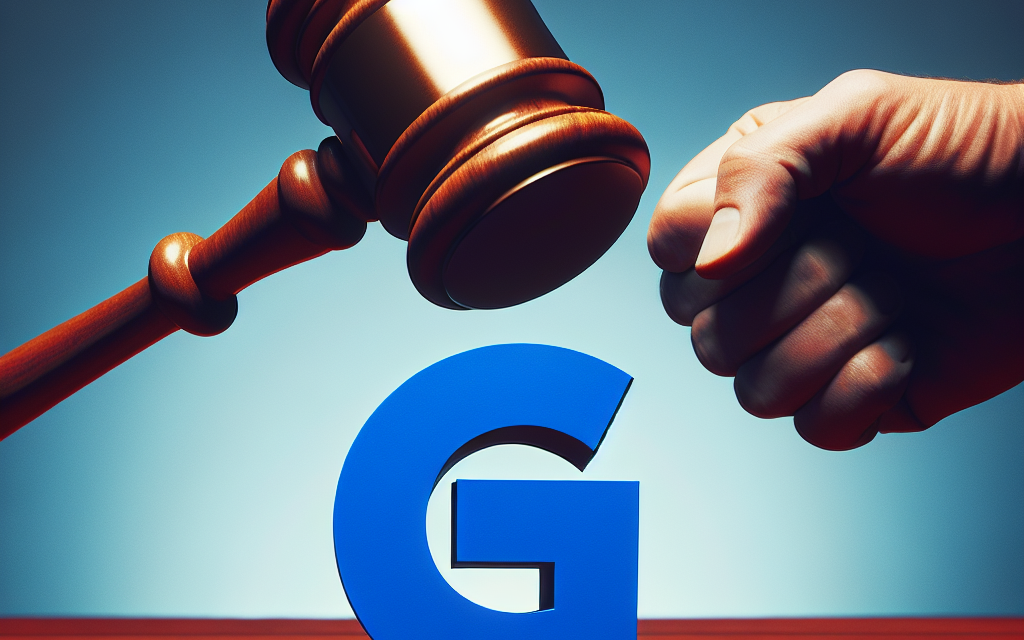“Supreme Court Upholds Advertisers’ Claims Against Meta: A Setback for Big Tech.”
Introduction
The U.S. Supreme Court recently declined to hear Meta Platforms Inc.’s request to dismiss a lawsuit filed by advertisers, which alleges that the company engaged in deceptive practices related to its advertising metrics. This decision allows the case to proceed in lower courts, potentially exposing Meta to significant legal challenges and financial liabilities. The lawsuit centers on claims that Meta misrepresented the effectiveness of its advertising services, leading advertisers to invest based on inflated performance metrics. The Supreme Court’s refusal to intervene underscores the ongoing scrutiny of digital advertising practices and the accountability of major tech companies in their business operations.
Supreme Court Ruling on Meta’s Advertiser Lawsuit
In a significant development for the digital advertising landscape, the United States Supreme Court has denied Meta Platforms Inc.’s request to dismiss a lawsuit brought forth by advertisers. This ruling marks a pivotal moment in the ongoing legal battles surrounding the practices of major tech companies, particularly in relation to their advertising policies and the transparency of their operations. The lawsuit, which has garnered considerable attention, centers on allegations that Meta engaged in deceptive practices that misled advertisers regarding the effectiveness of their ads on platforms such as Facebook and Instagram.
The advertisers contend that Meta’s claims about the reach and engagement of their advertisements were not only exaggerated but also misleading, leading to substantial financial losses. They argue that the company failed to provide accurate metrics and data, which are crucial for advertisers to make informed decisions about their marketing strategies. By denying Meta’s request to dismiss the case, the Supreme Court has allowed the lawsuit to proceed, thereby opening the door for a deeper examination of the practices employed by one of the largest social media companies in the world.
This ruling is particularly noteworthy as it underscores the growing scrutiny that tech giants face regarding their business practices. In recent years, there has been an increasing demand for accountability and transparency in the digital advertising sector, as advertisers seek to ensure that their investments yield tangible results. The Supreme Court’s decision reflects a broader trend in which courts are willing to engage with complex issues surrounding digital marketing and the responsibilities of platforms that serve as intermediaries between advertisers and consumers.
Moreover, the implications of this ruling extend beyond Meta itself. As the case progresses, it may set a precedent for how similar lawsuits are handled in the future, potentially influencing the operational standards of other tech companies involved in digital advertising. The outcome could lead to increased regulatory scrutiny and a reevaluation of advertising practices across the industry, prompting companies to adopt more transparent methodologies in their reporting and analytics.
In light of this ruling, advertisers may feel emboldened to challenge other tech companies regarding their advertising practices, particularly if they believe they have been misled or if they have suffered financial harm as a result of deceptive claims. This could lead to a wave of litigation aimed at holding companies accountable for their advertising metrics and the accuracy of their performance reports. As the digital advertising landscape continues to evolve, the need for clear and honest communication between platforms and advertisers becomes increasingly critical.
Furthermore, the Supreme Court’s decision highlights the importance of consumer trust in the digital marketplace. Advertisers rely heavily on the data provided by platforms to reach their target audiences effectively. If that data is found to be unreliable or misleading, it not only affects advertisers but also undermines consumer confidence in the platforms themselves. As such, the ruling serves as a reminder that transparency and accountability are essential components of a healthy digital advertising ecosystem.
In conclusion, the Supreme Court’s denial of Meta’s request to dismiss the advertisers’ lawsuit represents a crucial moment in the ongoing dialogue about accountability in the tech industry. As the case unfolds, it will be essential to monitor its implications for both advertisers and the broader digital advertising landscape, as it may pave the way for more rigorous standards and practices that prioritize transparency and trust.
Implications of the Denial for Meta’s Advertising Practices
The recent decision by the US Supreme Court to deny Meta’s request to dismiss a lawsuit brought by advertisers has significant implications for the company’s advertising practices. This ruling not only underscores the legal challenges that Meta faces but also highlights the broader scrutiny of digital advertising practices in an increasingly regulated environment. As the case progresses, it is essential to consider how this development may affect Meta’s operational strategies and its relationship with advertisers.
First and foremost, the denial of Meta’s request signals a willingness of the judiciary to engage with the complexities of digital advertising and the responsibilities of platforms like Meta. Advertisers have raised concerns regarding the transparency and accuracy of the data provided by Meta, particularly in relation to ad performance metrics. The lawsuit alleges that Meta misrepresented the effectiveness of its advertising services, which could lead to significant financial repercussions for the company if the court finds in favor of the advertisers. This situation compels Meta to reassess its advertising practices and the data it provides to clients, as any perceived dishonesty could erode trust and drive advertisers to seek alternatives.
Moreover, the implications of this ruling extend beyond the immediate legal ramifications. As advertisers become increasingly aware of their rights and the potential for legal recourse, they may demand greater accountability from Meta and similar platforms. This shift could lead to a more rigorous standard for advertising practices across the industry, prompting Meta to enhance its transparency measures. In doing so, the company may need to invest in better data analytics and reporting tools to ensure that advertisers receive accurate and reliable information about their campaigns. Such investments could be costly but necessary to maintain Meta’s competitive edge in the digital advertising landscape.
Additionally, the lawsuit’s progression may influence Meta’s advertising policies and practices in a broader sense. As the company navigates the legal challenges, it may adopt more conservative approaches to its advertising strategies, prioritizing compliance over aggressive growth tactics. This shift could result in a more cautious approach to new advertising features or products, as Meta seeks to mitigate potential legal risks. Consequently, this could slow down innovation within the advertising space, as the company may hesitate to roll out new tools or capabilities that could be perceived as misleading or deceptive.
Furthermore, the denial of the dismissal request may also have reputational implications for Meta. The company has faced scrutiny over various issues, including data privacy and misinformation, and this lawsuit adds another layer to its public image challenges. As the case unfolds, it will likely attract media attention, which could further impact how advertisers and consumers perceive Meta. A negative perception could lead to a decline in advertiser confidence, prompting some to reconsider their partnerships with the platform.
In conclusion, the US Supreme Court’s decision to deny Meta’s request to dismiss the advertisers’ lawsuit carries significant implications for the company’s advertising practices. As the legal proceedings continue, Meta may be compelled to enhance transparency, adopt more cautious strategies, and invest in better data reporting tools. Additionally, the reputational risks associated with the lawsuit could influence advertiser confidence and reshape the dynamics of digital advertising. Ultimately, this ruling serves as a reminder of the evolving landscape of digital marketing and the importance of accountability in an era where data integrity is paramount.
Legal Precedents Set by the Supreme Court’s Decision
The recent decision by the U.S. Supreme Court to deny Meta’s request to dismiss a lawsuit brought by advertisers marks a significant moment in the intersection of technology and legal accountability. This ruling not only underscores the court’s willingness to engage with complex issues surrounding digital advertising but also sets important legal precedents that could shape the future of online marketing practices. By allowing the case to proceed, the Supreme Court has opened the door for a deeper examination of how social media platforms manage user data and the implications of their advertising strategies.
In this context, the lawsuit revolves around allegations that Meta, the parent company of Facebook and Instagram, misled advertisers regarding the effectiveness of their advertising tools. Advertisers claim that they were not provided with accurate metrics, which ultimately affected their marketing strategies and financial investments. The Supreme Court’s decision to allow this case to move forward signals a recognition of the potential for harm that can arise from misleading advertising practices in the digital realm. This is particularly relevant as businesses increasingly rely on social media platforms to reach their target audiences.
Moreover, the ruling may set a precedent for how courts interpret the responsibilities of tech companies in relation to their advertising claims. Historically, the legal landscape surrounding advertising has been shaped by traditional media, where regulations and standards have been more clearly defined. However, the rapid evolution of digital platforms has created a gray area in which advertisers may find themselves vulnerable to misleading practices. By affirming the legitimacy of the advertisers’ claims, the Supreme Court is effectively reinforcing the notion that tech companies must adhere to the same standards of accountability as their traditional counterparts.
Furthermore, this decision could have broader implications for the tech industry as a whole. As more companies navigate the complexities of digital advertising, the legal framework established by this case may serve as a benchmark for future litigation. If the courts continue to uphold the rights of advertisers in similar situations, it could lead to a more stringent regulatory environment for social media platforms. This, in turn, may compel these companies to adopt more transparent practices regarding user data and advertising metrics, ultimately benefiting both advertisers and consumers.
In addition, the Supreme Court’s ruling highlights the importance of consumer protection in the digital age. As users become increasingly aware of how their data is utilized, there is a growing demand for transparency and accountability from tech companies. The court’s decision to allow the lawsuit to proceed reflects a broader societal shift towards holding corporations accountable for their actions, particularly when those actions have the potential to mislead or harm consumers. This trend may encourage more individuals and organizations to seek legal recourse against companies that engage in deceptive practices.
In conclusion, the Supreme Court’s denial of Meta’s request to dismiss the advertisers’ lawsuit is a pivotal moment that could reshape the legal landscape surrounding digital advertising. By allowing the case to move forward, the court has not only affirmed the rights of advertisers but has also set a precedent that may influence how tech companies operate in the future. As the digital advertising space continues to evolve, this ruling serves as a reminder of the importance of transparency and accountability in fostering trust between companies and their clients. Ultimately, the implications of this decision will likely resonate throughout the industry, prompting a reevaluation of practices that have long gone unchallenged.
Impact on Digital Advertising Industry Post-Ruling
The recent decision by the U.S. Supreme Court to deny Meta’s request to dismiss a lawsuit brought by advertisers marks a significant moment in the digital advertising landscape. This ruling not only underscores the legal vulnerabilities that major tech companies face but also sets a precedent that could reshape the dynamics of digital marketing and advertising practices. As the implications of this decision unfold, stakeholders across the industry are beginning to assess its potential impact on their operations and strategies.
To begin with, the lawsuit centers around allegations that Meta, the parent company of Facebook and Instagram, engaged in deceptive advertising practices. Advertisers claim that they were misled about the effectiveness of their ads, which raises critical questions about transparency and accountability in digital advertising. The Supreme Court’s refusal to dismiss the case signals a willingness to scrutinize the practices of large tech firms, thereby encouraging a more rigorous examination of how advertising metrics are reported and interpreted. This scrutiny could lead to increased regulatory oversight, compelling companies to adopt more transparent practices in their advertising methodologies.
Moreover, the ruling may instigate a shift in how advertisers approach their campaigns. With the potential for legal repercussions looming, advertisers may become more cautious in their dealings with platforms like Meta. This could result in a demand for clearer metrics and more reliable data from advertising platforms, as advertisers seek to protect themselves from potential legal liabilities. Consequently, companies may need to invest in better analytics tools and reporting systems to ensure that they can provide accurate and verifiable data to their clients.
In addition to altering advertiser behavior, the ruling could also influence the relationship between advertisers and social media platforms. As advertisers become more vigilant about the accuracy of their ad performance data, they may seek to diversify their advertising strategies, reducing their reliance on any single platform. This diversification could lead to a more competitive landscape, where smaller platforms gain traction as advertisers explore alternative channels to reach their audiences. As a result, the digital advertising ecosystem may become more fragmented, with advertisers leveraging a broader array of platforms to mitigate risks associated with any one provider.
Furthermore, the decision may prompt other tech companies to reevaluate their advertising practices. As the industry watches how Meta navigates this legal challenge, other firms may proactively adjust their policies and practices to avoid similar lawsuits. This could lead to a broader industry-wide shift towards enhanced transparency and accountability, fostering a more ethical advertising environment. In turn, this shift could improve consumer trust in digital advertising, as users become more confident that the ads they encounter are based on accurate representations of performance.
In conclusion, the Supreme Court’s ruling against Meta has far-reaching implications for the digital advertising industry. By denying the company’s request to dismiss the lawsuit, the Court has opened the door for greater scrutiny of advertising practices, which may lead to increased regulatory oversight and a demand for transparency. As advertisers reassess their strategies and relationships with platforms, the industry may witness a shift towards more diversified advertising approaches. Ultimately, this ruling could catalyze a transformation in how digital advertising operates, fostering a more accountable and trustworthy environment for all stakeholders involved. As the legal proceedings continue, the industry will undoubtedly be watching closely, anticipating the changes that may arise in response to this landmark decision.
Analysis of Advertisers’ Claims Against Meta
The recent decision by the US Supreme Court to deny Meta’s request to dismiss a lawsuit brought by advertisers marks a significant moment in the ongoing scrutiny of the tech giant’s advertising practices. This lawsuit, which has garnered considerable attention, centers on claims that Meta engaged in deceptive practices that misled advertisers regarding the effectiveness of their ads. As the case unfolds, it is essential to analyze the specific claims made by the advertisers and the broader implications for the digital advertising landscape.
At the heart of the advertisers’ claims is the assertion that Meta provided misleading information about the performance metrics of its advertising services. Advertisers allege that they were led to believe that their ads were reaching a larger audience and generating more engagement than was actually the case. This discrepancy between reported performance and actual outcomes raises critical questions about transparency and accountability in digital advertising. Advertisers contend that they relied on Meta’s data to make informed decisions about their marketing strategies, and any inaccuracies in this data could have significant financial repercussions for their businesses.
Moreover, the lawsuit highlights the broader issue of trust in digital advertising platforms. As advertisers increasingly allocate substantial portions of their budgets to online advertising, the expectation for accurate and reliable performance metrics becomes paramount. The claims against Meta suggest a potential breach of this trust, as advertisers argue that they were not only misled but also deprived of the opportunity to make better-informed decisions regarding their advertising investments. This situation underscores the need for greater transparency in how digital platforms report ad performance and the metrics they use to measure success.
In addition to the claims of misleading information, the lawsuit also raises concerns about the competitive landscape of digital advertising. Meta, as one of the largest players in this space, holds significant power over advertisers who depend on its platform to reach their target audiences. The allegations suggest that Meta’s practices may have stifled competition by creating an environment where advertisers felt compelled to continue investing in a platform that may not have delivered the promised results. This dynamic could have far-reaching implications for smaller advertising firms and new entrants in the market, who may struggle to compete against a dominant player that is perceived to manipulate performance data.
Furthermore, the Supreme Court’s decision to allow the lawsuit to proceed signals a potential shift in how courts may view cases involving large technology companies. Historically, these companies have often been able to dismiss lawsuits on various grounds, including claims of free speech or the complexities of digital platforms. However, the court’s willingness to hear the advertisers’ claims suggests a growing recognition of the need to hold tech giants accountable for their business practices, particularly when those practices may harm consumers and businesses alike.
As the case progresses, it will be crucial to monitor how the legal arguments unfold and what precedents may be set as a result. The outcome could not only impact Meta’s operations but also influence how other digital advertising platforms approach transparency and accountability. Ultimately, this lawsuit serves as a reminder of the importance of trust in the digital economy and the need for robust mechanisms to ensure that advertisers can rely on the data provided by platforms like Meta. As the landscape of digital advertising continues to evolve, the resolution of this case may play a pivotal role in shaping the future of advertising practices and the relationship between advertisers and technology companies.
Future of Meta’s Legal Challenges in Advertising
The recent decision by the US Supreme Court to deny Meta’s request to dismiss a lawsuit brought by advertisers marks a significant moment in the ongoing legal challenges faced by the tech giant in the realm of advertising. This ruling not only underscores the complexities of digital advertising but also highlights the increasing scrutiny that major technology companies are under regarding their business practices. As the legal landscape continues to evolve, the implications for Meta and similar companies could be profound.
In the wake of this ruling, it is essential to consider the broader context of advertising practices within the digital space. Advertisers have long expressed concerns about transparency and accountability in how their ads are displayed and the metrics used to measure their effectiveness. The lawsuit against Meta centers on allegations that the company misrepresented the effectiveness of its advertising services, leading to significant financial losses for advertisers. This situation reflects a growing trend where advertisers are demanding greater clarity and fairness in their dealings with platforms that wield substantial influence over consumer behavior.
Moreover, the Supreme Court’s decision may embolden other advertisers to pursue similar legal actions against Meta and other tech companies. As the digital advertising ecosystem becomes increasingly competitive, advertisers are likely to seek legal recourse to protect their interests. This potential wave of litigation could lead to a reevaluation of advertising practices across the industry, prompting companies to adopt more transparent and ethical standards. Consequently, Meta may find itself navigating a complex web of legal challenges that could reshape its advertising strategies and operational frameworks.
In addition to the immediate implications of the lawsuit, the ruling also raises questions about the future regulatory environment for digital advertising. Lawmakers and regulatory bodies are paying closer attention to the practices of major tech companies, particularly in light of growing concerns about data privacy and consumer protection. As public sentiment shifts towards greater accountability, it is plausible that new regulations could emerge, further complicating the landscape for companies like Meta. The need for compliance with evolving legal standards may necessitate significant changes in how Meta conducts its advertising business.
Furthermore, the ongoing legal challenges could impact Meta’s financial performance and market position. Investors are likely to scrutinize the company’s ability to manage legal risks and adapt to a changing regulatory environment. If advertisers perceive Meta as a less reliable partner due to ongoing litigation, they may reconsider their advertising budgets and strategies, potentially leading to a decline in revenue for the company. This scenario underscores the interconnectedness of legal challenges and business performance in the tech industry.
As Meta grapples with these challenges, it will be crucial for the company to engage in proactive measures to restore trust with advertisers. This may involve enhancing transparency in advertising metrics, improving communication with clients, and demonstrating a commitment to ethical advertising practices. By taking these steps, Meta could mitigate some of the negative repercussions of the lawsuit and position itself favorably in an increasingly competitive market.
In conclusion, the Supreme Court’s denial of Meta’s request to dismiss the advertisers’ lawsuit signals a pivotal moment in the company’s ongoing legal challenges. As the landscape of digital advertising continues to evolve, Meta must navigate a complex interplay of legal, regulatory, and market dynamics. The outcome of this lawsuit and any subsequent legal actions will undoubtedly shape the future of advertising practices within the tech industry, making it imperative for Meta to adapt and respond effectively to these challenges.
Reactions from Advertisers and Legal Experts on the Ruling
The recent decision by the US Supreme Court to deny Meta’s request to dismiss a lawsuit brought forth by advertisers has elicited a range of reactions from both the advertising community and legal experts. This ruling, which allows the case to proceed, underscores the ongoing tensions between digital advertising practices and legal accountability. Advertisers, who have long relied on platforms like Meta for targeted marketing, are now grappling with the implications of this legal development. Many in the advertising sector view the lawsuit as a pivotal moment that could reshape the landscape of digital advertising.
In the wake of the ruling, several advertisers expressed a sense of cautious optimism. They believe that the lawsuit could lead to greater transparency and accountability in how advertising data is managed and utilized by major tech companies. This sentiment is particularly pronounced among smaller advertisers who often feel overshadowed by larger corporations with more resources. The prospect of a legal framework that mandates clearer guidelines for data usage and advertising practices is seen as a potential leveling of the playing field. As one advertiser noted, “This could be a turning point for how we engage with platforms like Meta. We need to ensure that our investments are protected and that we have a clear understanding of how our data is being used.”
Conversely, some advertisers are apprehensive about the potential ramifications of the lawsuit. They worry that a protracted legal battle could lead to increased costs and uncertainty in the advertising ecosystem. The fear is that if Meta is found liable, it may respond by tightening its advertising policies or raising prices, which could ultimately disadvantage advertisers. This concern is echoed by legal experts who caution that the outcome of the case could set a precedent that affects not only Meta but the entire digital advertising industry. As one legal analyst pointed out, “The implications of this ruling extend far beyond this single case. It could redefine the relationship between advertisers and platforms, influencing how data privacy laws are interpreted in the future.”
Moreover, legal experts have highlighted the broader implications of the Supreme Court’s decision in the context of ongoing debates about data privacy and consumer protection. The ruling signals a willingness by the judiciary to scrutinize the practices of major tech companies, which have often operated with a degree of impunity. This scrutiny is particularly relevant in an era where consumers are increasingly concerned about how their personal information is collected and used. As discussions around data ethics continue to evolve, the outcome of this lawsuit may serve as a catalyst for more stringent regulations in the digital advertising space.
In addition to the immediate reactions from advertisers and legal experts, the ruling has sparked a wider conversation about the responsibilities of tech companies in safeguarding user data. Many stakeholders are now calling for a more collaborative approach between advertisers and platforms to establish best practices that prioritize consumer trust. This dialogue is essential, as it may lead to the development of industry standards that not only protect advertisers but also enhance consumer confidence in digital advertising.
In conclusion, the Supreme Court’s decision to allow the lawsuit against Meta to proceed has generated a complex array of reactions from advertisers and legal experts alike. While some see it as an opportunity for reform and greater accountability, others express concern over the potential consequences for the advertising industry. As the case unfolds, it will undoubtedly continue to shape the discourse surrounding digital advertising practices and the legal frameworks that govern them.
Q&A
1. **What was the main issue in the lawsuit against Meta?**
The lawsuit alleged that Meta engaged in deceptive advertising practices that misled advertisers about the effectiveness of their ads.
2. **What did Meta request from the Supreme Court?**
Meta requested the Supreme Court to dismiss the lawsuit filed by advertisers.
3. **What was the Supreme Court’s decision regarding Meta’s request?**
The Supreme Court denied Meta’s request to dismiss the lawsuit.
4. **What implications does the Supreme Court’s decision have for Meta?**
The decision allows the lawsuit to proceed, potentially exposing Meta to further legal challenges and financial liabilities.
5. **What are advertisers claiming in the lawsuit?**
Advertisers claim that Meta’s advertising metrics were misleading and that they suffered financial losses as a result.
6. **How might this ruling affect other tech companies?**
The ruling could set a precedent for similar lawsuits against other tech companies regarding advertising practices and transparency.
7. **What is the next step for the lawsuit following the Supreme Court’s decision?**
The lawsuit will move forward in the lower courts, where evidence will be presented and the case will be litigated.
Conclusion
The US Supreme Court’s decision to deny Meta’s request to dismiss the advertisers’ lawsuit underscores the ongoing legal challenges the company faces regarding its advertising practices. This ruling allows the case to proceed, potentially exposing Meta to significant financial liabilities and setting a precedent for how digital advertising practices are regulated. The outcome may have broader implications for the tech industry and its accountability to advertisers and consumers alike.





